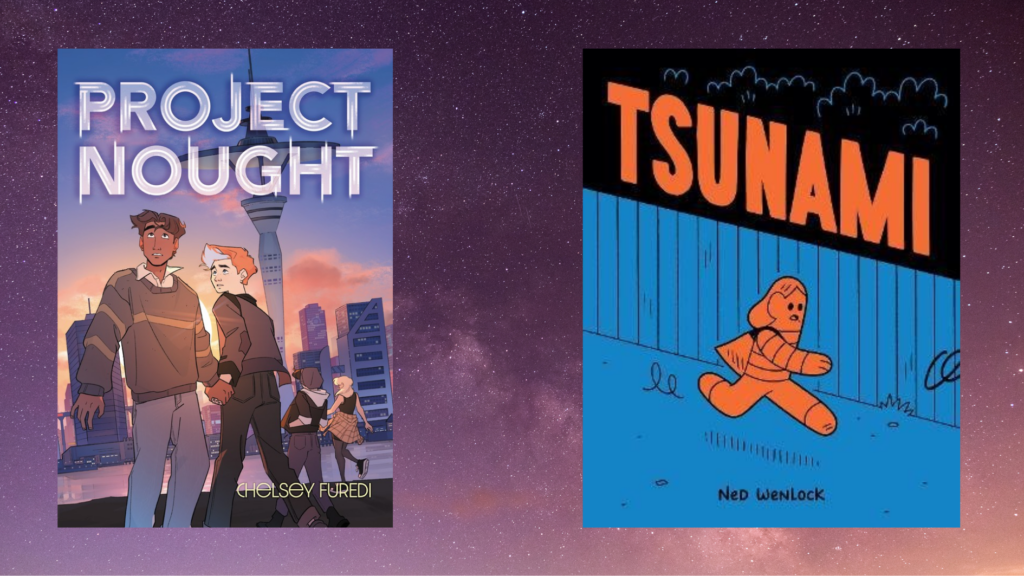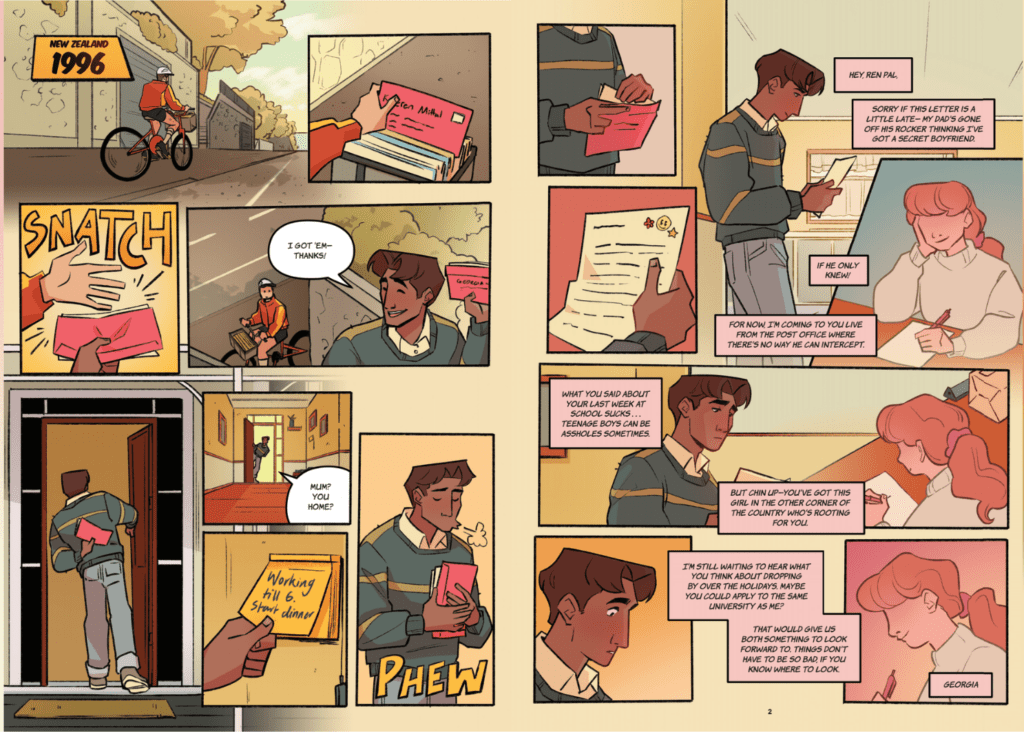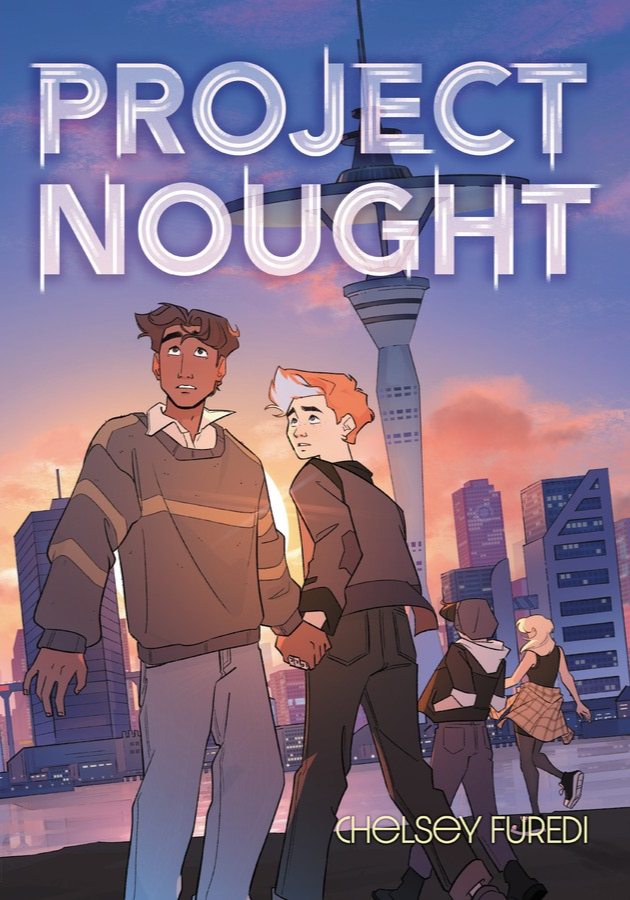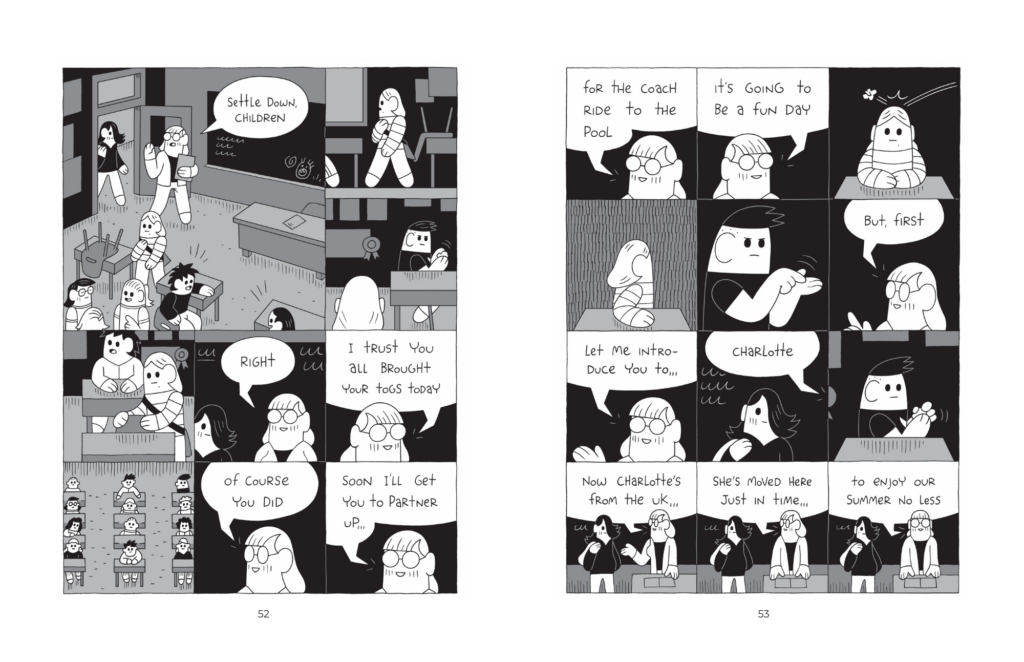Cartoonist and illustrator Eddie Monotone gives us his hot takes on a story set in a far-distant Aotearoa and a poignant portrayal of bullying.

Project Nought, by Chelsey Furedi
The premise of Project Nought is simple: what if a teenager from the 1990s was brought into the future of 2122, for something like a sci-fi school exchange program? But what seems like a fun adventure develops into something much more complicated and sinister as the main characters struggle with relationships, existential questions, and corporate arrogance.
What seems like a fun adventure develops into something much more complicated and sinister as the main characters struggle with relationships, existential questions, and corporate arrogance
This is Chelsea Furedi’s first published book, although she has an established reputation online. Project Nought started life on the online platform Tapas, and it has a real webcomic feel about it in terms of the pacing and the overall aesthetic. The art style is warm and stylish, with the occasional cartoony flourish. It reminds me a bit of Jenn St-Onge’s work on Jem and the Holograms and Nancy Drew, and fans of those books would probably find a lot to like in Project Nought. The similarity goes beyond the art: Furedi’s blend of high concept and down-to-earth relationships, along with her character-based comedy, is reminiscent of Kelly Thompson, the writer behind Jem and the Holograms and Nancy Drew.

Project Nought is set in New Zealand—albeit far-future New Zealand—but the world is a universally relatable one. You don’t need any deep understanding of New Zealand culture to understand the relationships and cultural dynamics: if you’ve ever seen a CW show, you’ll be fine.
At first glance, the future of 2122 as shown in Project Nought doesn’t feel all that futuristic—in most ways it looks like 2008 with better queer acceptance. But that’s the thing, of course. As a straight cis guy, I can dream of a future with rocket packs and robot helpers because my basic needs are already met in the present. But for the queer community, a world of acceptance, casual pronoun use, and forgotten discrimination can seem distressingly fantastical. Project Nought recognises this and chooses to avoid mining those sources of drama, instead letting queer characters have a story where queerness is a core part of their lives, but not the sole source of conflict.
[Project Nought lets] queer characters have a story where queerness is a core part of their lives, but not the sole source of conflict
The book takes its time establishing the characters and their relationships before the main plot kicks in, and once it does, the sci-fi thriller aspects of the story come to the fore. It’s as much a romance as it is an adventure story, and it’s in the balance of these two threads where the book shines.
I won’t spoil the ending or the twists that happen on the way, but the story resolves in a way that is satisfying without taking trite, easy routes to get there. And ultimately Project Nought tells us an important message: even in a world without homophobia, corporations will never care about you.

Tsunami, by Ned Wenlock
Despite having a younger set of characters and a more down-to-earth setting, Tsunami is a much darker story than Project Nought. Wenlock’s cartoony style is deceptive, giving the impression of light-hearted comedy before hitting you with something bleak.
Peter is an awkward, isolated preteen coming to the end of primary school. His combative relationship with the bully Gus is made more complicated by the arrival of new girl Charlie, who adds an unpredictable element to an already difficult situation.
The core of Tsunami is about bullying and the fractious relationships between kids transitioning from children to young adults
The core of Tsunami is about bullying and the fractious relationships between kids transitioning from children to young adults. It’s a nuanced take on what could have been a stereotypical story. The bullies aren’t single-minded monsters, the protagonist isn’t a plucky nice guy. All the characters are complicated, multi-faceted, and very real. This extends beyond the kids at the heart of the story—their parents also have layers and their own lives carrying on in the background.

While Project Nought’s New Zealand is a universal everyplace, Tsunami’s small-town setting is drenched in a specific Kiwiness that will have you relating and cringing in equal measures. I’m not being critical when I say that—the specificity is what grounds the story and gives it its weight. It’s like the early Arctic Monkeys records, in the way that the details Alex Turner adds into the lyrics lets you relate far more than more universal generalities would, even if you haven’t lived that exact experience.
Wenlock has been making comics for a long time (I remember seeing his zines at least fifteen years ago and being blown away by his comics then, too). Wenlock’s art style, now as it was then, is confident in its minimalism. With only a few lines to show a face, a posture, a setting, you need to be able to strip your subject down to its purest essence. There’s no fat on these illustrations; every line or lack thereof is done with purpose. The result is an understated and consistent visual style that takes a back seat to the story, but nevertheless does a lot of heavy lifting to get that story across. If you’re not into cartoon art, you can read Tsunami purely for the story. If you are into graphic storytelling, you’ll enjoy seeing an accomplished artist at work. The full-page chapter break illustrations are particularly beautiful in their restraint.
Wenlock’s art style, now as it was then, is confident in its minimalism…every line or lack thereof is done with purpose
Tsunami isn’t an easy read, and although it has some nicely observed humour here and there, I don’t know if I’d say it’s a fun one. But it’s a powerfully human coming-of-age story, and one of the best representations of New Zealand life I’ve seen in comics. Highly recommended.


Eddie Monotone
Eddie Monotone is a cartoonist, illustrator and parent. He has been a part of the Kiwi comics scene for many years, publishing comics and cartoons both in print and online. When he’s not making comics he’s probably thinking about comics, and sharing those thoughts with anyone who’ll listen. www.edmocentral.com



